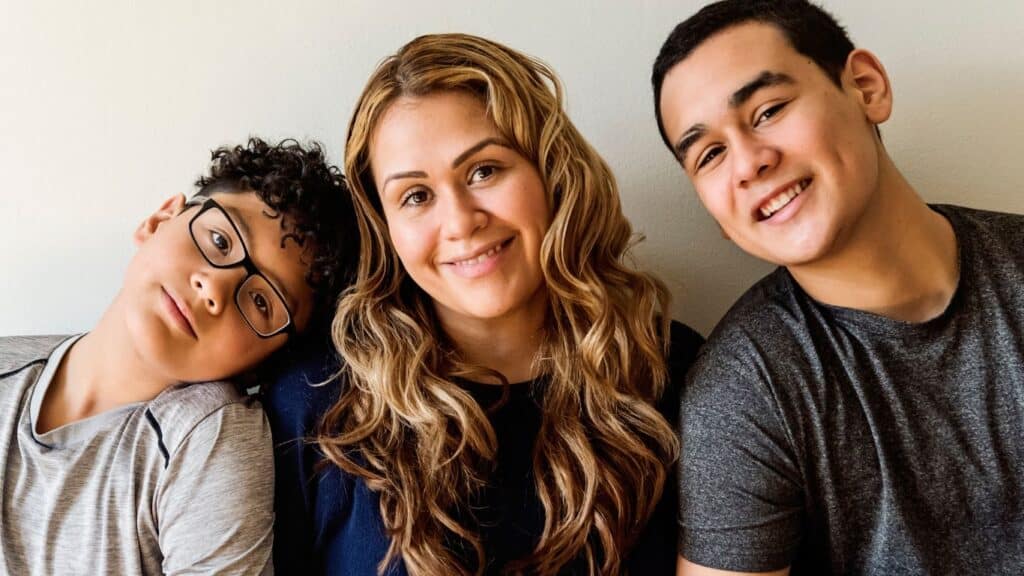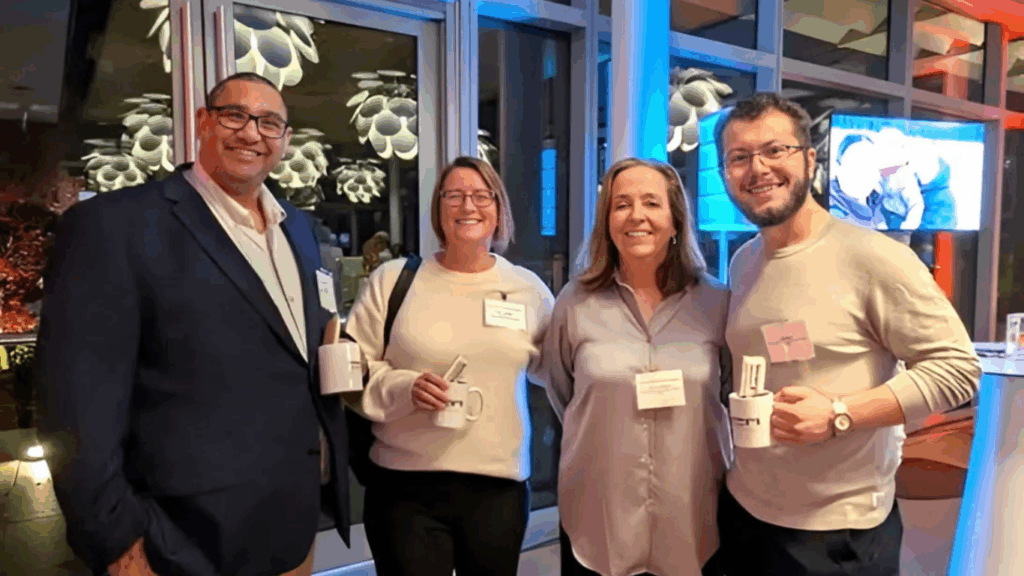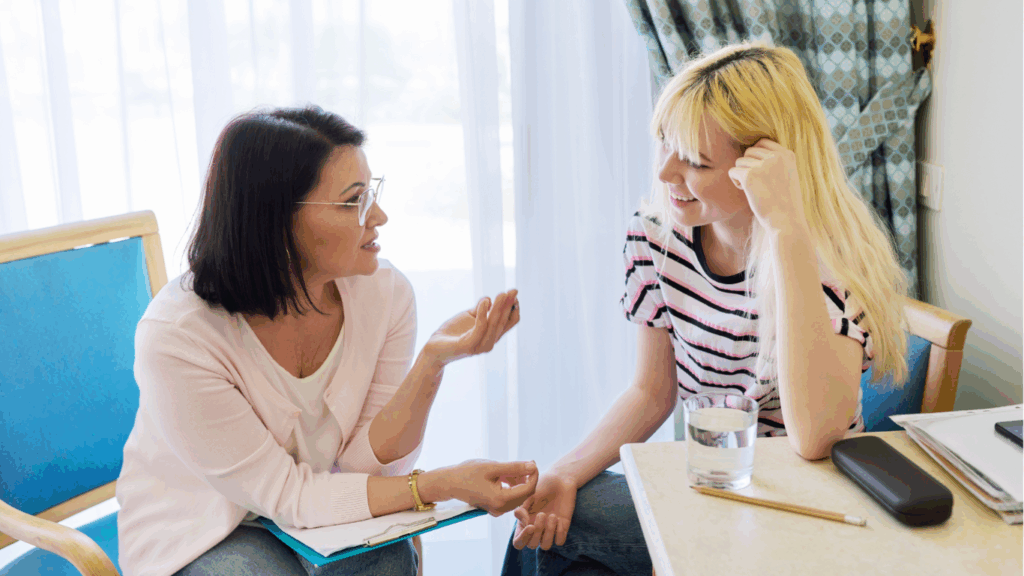In part two of our teen adoption Q&A, Ashleigh Martinflatt, a clinical counsellor, post-secondary instructor, and adoptive parent, dives deeper into the journey of providing permanency for teens. She addresses concerns around bonding, managing missed milestones, navigating the mixed emotions teens may experience, and offers advice on supporting adopted teens.
I’m scared that I won’t bond with my teenager. Do you have any advice?
You probably won’t bond at first, so let’s just put that as an expectation, then there’s nothing to be scared of. It takes a long time to build a relationship and get to know someone. It’s not some magical moment where you see each other and doves fly out into the sky. Like every other relationship in your life, it takes time, effort, and patience.
The very first thing I would say is just acknowledge that you’re not going to bond deeply right away. By setting this expectation, you won’t be upset when it doesn’t happen. There are lots of people who give birth to infants who don’t bond with them right away, and there are lots of people who adopt three-year-olds who don’t bond with them right away either. This is a process of getting to know each other and falling in love slowly.
You’re also falling in love with someone who’s hurting terribly. I encourage people to think about themselves when they’ve been hurting. Did you put forward your best self? Were you easily lovable? For myself, I can at least say that I wasn’t, and that would have made bonding with me a lot more difficult. When we think about trauma responses—flight, fight, freeze, or appease—that’s often what someone will show when they come into your home. Depending on the response, if we’ve got a fighter or a flighter, that makes it hard to fall in love and bond with someone.
Just recognize that it’s not like a simple switch of bonded/unbonded, it’s a dimmer switch. It’s going to happen slowly, and sometimes it dims down a bit, and sometimes it goes back up. It will happen, but it’s just going to take time, and being open to that time is the best gift you can give yourself and the youth. Also, just a side note, I know lots of parents of teenagers who weren’t adopted who don’t feel particularly bonded at certain stages in their development, so let’s normalize some of those pieces too.
Will I miss out on important milestones if I adopt an older child?
Yes, you absolutely will. You weren’t there for their first steps, their first haircut, or when their tooth fell out. If those things matter to you, it’s important to acknowledge that you’ve missed them and, if necessary, work through the feelings that are associated with missing those pieces.
However, you do have a whole set of firsts that are amazing, ones that other parents of teenagers might take for granted. The first time they tell you that they love you, the first time they start doing dishes next to you without being asked, the first time they refer to you as a parent to somebody out in public, the first time you take them for driving lessons and you’re there to support them through this significant milestone, the first time they get a great report card or you notice an improvement in their report card and take them out to celebrate.
You have your own set of unique firsts that are pretty amazing. You just have to let go of the ones that society has deemed as the “important” firsts. What’s ironic is that sometimes these first, because they’re being celebrated so much during those teen years, can bring people closer. Celebrating these attachment and bonding moments, even for achievements that might not seem significant to someone else, can be pretty powerful for a teenager.
These kids deserve to be honoured and held up from the day they were born. For some of them, that didn’t happen, or it happened on and off. But once they’re in your home, if you can focus on how you’re walking alongside them in their healing, honouring them, and supporting them to be their best selves, that’s a pretty cool set of firsts to be part of.
Do most teens want to be adopted?
The kicker is that they have to if they’re being adopted, they have to sign for it if they’re 12 or older. Having said that, I imagine there are mixed emotions. I can’t even imagine how terrifying that must be with a history of transitions and abandonment. The amount of courage it takes for these kids to say “Okay, big people, I’m going to give you one more try at this,” when historically we don’t have a good track record for them. I think it takes an amazing amount of courage, and shockingly, many of them do say they would like permanency.
That doesn’t mean they want permanency every minute of every day. Sometimes it feels really scary, and they might pull back a bit. Other times, they might even feel angry about why they’re in a position where they even need to have permanency. That’s human nature though, none of us feel 100% certain about something all the time. Again, the key piece is not to take it personally. This isn’t about you, it’s about their history, how they’ve been treated, and the losses that they’ve experienced. It’s about the courage it takes to step forward one more time and give people another chance.
What are some good programs that you know of to support my adopted teenager?
Finding other adoptive families in your community and seeing if there are any kids or youth around the same age who have similar lived experiences can be helpful to normalize what they’ve gone through. This means doing some of the legwork yourself as a parent, reaching out and trying to find people in your community.
Luckily, with everything online, there are tons of ways youth can reach out, connect, and get support. It’s really powerful when they meet other kids who’ve had similar experiences, whether it be international adoption or extended family placements. There are commonalities that transfer across all of them, so try to find communities of support. The Belonging Network can help you with locating people in your community who you might be able to connect with.
Another thing to recognize is that they’ll engage when they’re ready. Some might say no at 12, 13, or 14, and then at 15 they might say “Yeah, okay, I would like to do that.” It’s not a one-and-done process, we have to keep offering support and providing opportunities for them to connect with others.
My adopted teen is lashing out at me. How should I approach this?
A lot of teens lash out at their parents. Sometimes people come to me and ask, “Is this because of their adoption?” And I say, “Well, I don’t know, but I just saw seven other people who weren’t adopted going through the same thing.”
Right now, we have a population of adolescents whose social and emotional development has been significantly impacted by the pandemic, as well as by the high level of technology they have access to. So, there’s a lot going on before we even talk about trauma and other factors. It’s important to recognize that many youth are struggling right now.
Especially when somebody has joined your family through permanency, it’s easy to take things personally and people will think, “They don’t like me, they don’t like it here, maybe this wasn’t a good match.” But this has nothing to do with you, this has to do with their experiences and how they’ve been treated in this world. When a teenager lashes out or shows their true self, it often means they feel safe and comfortable to do so. If you can try to reframe it in that way, it can be helpful.
The number one thing I’d say is that people often contact me because they want support for their teens. What I would say is, “How about we work with you as a parent?” Often, it’s the parent who requires more support than the teenager. When the parent is able to see things differently, they parent differently. As the parent, you have the single biggest impact on your child, not one hour with me a week.
If we can get parents the right support, which could mean joining a community like a group through the Belonging Network where you’re meeting other adoptive parents, getting professional support, or meeting someone in your community who’s also adopted. Let’s just let our teenagers heal, let’s let them emote and be who they need to be, while you get the support you need to provide an environment that says, “Hey, whether you’re lashing out or not, you belong here, you’re safe, and we’re going to get through this.”
Is there anything else you’d like to add?
There are many things that can seem intimidating and scary about moving forward with permanency, but one of the things I learned very quickly is that the benefits of adopting somebody who can speak and share their emotions is that you can work through these things together. I’ve adopted children across different age ranges, and I would say one of the hardest age ranges is three to five because, at that age, they don’t yet have the cognitive ability to rationalize their needs, wants, hurts, or behaviours. They’re just too little, so they act out and we see that happening in their behaviour, which can be really hard for them and everybody who loves them.
With teenagers, when things have calmed down and it’s appropriate, there can be some rich discussions where we help them process and find the words to talk about how they’re feeling and how we can help them. Having these discussions and modelling how to talk about feelings is unique to youth permanency.
This is why I love working with youth so much—they’re so quick to implement changes. Adults are so slow to change sometimes. They’ve been doing things a certain way for 30 years, so making a change is often painful. But with youth, if we’re able to have a good discussion and offer an alternative suggestion or a substitution, rather than just telling them not to do something, we often see them implement it pretty quickly. It’s pretty awesome to be part of someone’s journey in this way, which doesn’t always happen with younger children.
The kids and youth in government care who are requesting permanency are amazing humans filled with capacity, strength, and resilience, and they have often navigated more things in life than most adults ever will. Permanency is sometimes seen as something that’s scary and can have negative connotations, and I want to help break down that perception. It’s a real honour to walk alongside a youth as they grow into a young adult and blossom and become this amazing human that you get to be part of their life. We need to work hard to flip the narrative about who these youth are and recognize their capacities and everything about them that’s amazing. If you can do that, then you’re the right person for this.





